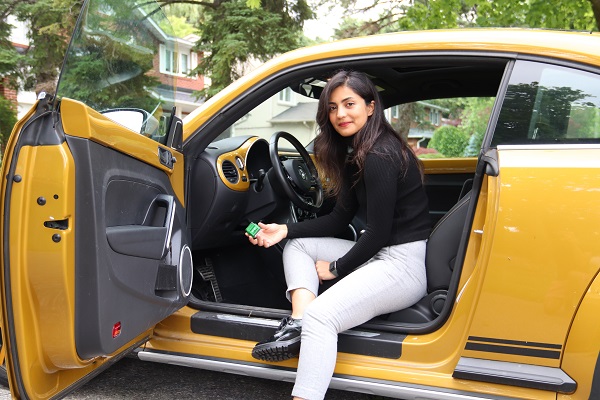By Annie Atkinson
As a newly-minted Assistant Professor at the University of Calgary, Dr. Sayeh Bayat is already encouraging her students to become AGE-WELL trainees – an experience she calls “incredible” in her own advancement as a researcher in technology and aging.
“It’s one of the first things I tell my students when they are starting in this field: join AGE-WELL’s EPIC (Early Professionals, Inspired Careers) training program,” says Dr. Bayat. AGE-WELL is Canada’s technology and aging network.
“AGE-WELL really helped me with transdisciplinary research, how to connect with older adults and stakeholders to learn about their experiences, and get connected with researchers and other trainees who have similar interests.” Dr. Bayat also received an AGE-WELL-University of Toronto Faculty of Applied Science and Engineering Graduate Student Award.
During her time with AGE-WELL, Dr. Bayat’s grandmother was diagnosed with Alzheimer’s disease. “I could see first-hand the changes in her life and the challenges she was facing.”
This further motivated Dr. Bayat’s postgraduate research in biomedical engineering at the University of Toronto (U of T), with AGE-WELL scientific director Dr. Alex Mihailidis as her advisor. Her studies probing the relationship between older adults and their environment have led to published papers and attracted coverage by the BBC and The New York Times.
Innovative ‘lifespace’ study
For her PhD thesis, Dr. Bayat delved into the question of whether GPS mobility can be used to explain, influence or even predict dementia. Her study used mobile GPS tracking with older adults – some with dementia (accompanied by family caregivers) and a comparison group of older adults with no cognitive issues – as they moved about the community by car, transit, bicycle or walking.
The findings showed that those with dementia moved about the community less, were less likely to go to new places or participate in sporting events, and were more likely to participate in medical activities than the control group. These findings could have implications for transportation policies and services, and inform community dementia strategies.
It was while presenting her study at an international research conference that Dr. Bayat met a team from Washington University at St. Louis that she and her AGE-WELL/U of T colleagues would collaborate with on her second doctoral study.
The researchers wanted to find out if driving habits alone could identify whether or not older adults had preclinical Alzheimer’s disease, an early stage of the disease where no symptoms are evident. Dr. Bayat and the team designed a model that could predict with 86% accuracy if an older person in the study had preclinical Alzheimer’s disease based solely on their age and driving data gathered by a GPS tracker in their car, and without the use of invasive or expensive medical procedures.
What the researchers found was fascinating.
“The machine learning algorithms were able to identify subtle patterns in driving that were associated with earlier signs of Alzheimer’s disease,” explains Dr. Bayat, who continues to explore this fertile field of research with the Washington University team. For example, those with early signs of Alzheimer’s were more likely to drive slower, make sudden changes, travel less at night, and drive shorter distances to fewer destinations using more confined routes, among other patterns observed.
Last fall, Dr. Bayat took up her new position at the University of Calgary in the Department of Biomedical Engineering, with a secondary appointment in the Geomatics Engineering Department. She is also a member of the Hotchkiss Brain Institute in the Cumming School of Medicine, and director of the Healthy City Laboratory.
Dr. Bayat believes that the relationship between older adults and their environments “holds significant information about people’s health and well-being.” Currently, she is working on digital biomarkers that would allow for earlier identification of Alzheimer’s disease.
While pursuing her academic and research career in Calgary, Dr. Bayat intends to stay involved in AGE-WELL, with a special interest in early-career researchers.
“I just want to thank everyone at AGE-WELL for all they do because they have been incredible for me, for my advancement both through graduate school and now as an early-career researcher. It’s great to have that network to rely on – they’re a really good support system.”
Annie Atkinson is a freelance writer. AGE-WELL is a federally-funded Network of Centres of Excellence. AGE-WELL brings together researchers, older adults, caregivers, partner organizations and future leaders to accelerate the delivery of technology-based solutions for healthy aging. For more information, visit www.agewell-nce.ca




